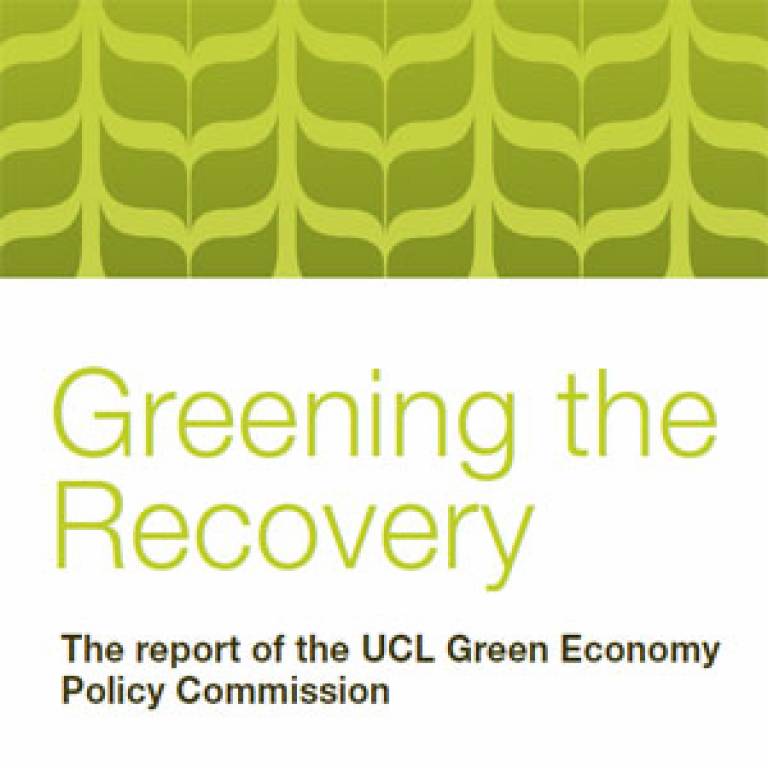Policies to green the economy must underpin UK recovery: new report
24 February 2014
Floods illustrate the need for urgent action from government to green the economic recovery, in order to address climate change and wider environment and resource issues, says UCL Commission Chair.

The UK urgently needs a green economic strategy to move towards low-carbon prosperity, resource security and environmental quality, says a new report published today by UCL's Green Economy Policy Commission.
The Commission - drawn from a range of academic disciplines across UCL - argues that the UK's current situation of climate instability and increasing resource constraints mean that decisive action is urgently needed by the UK government to green the economy.
Greening the Recovery argues that there is a window of opportunity for policies that acknowledge future resource constraints and deliver more sustainable growth. Such policies will address fundamental structural weaknesses and achieve a sounder economic recovery. The report provides a comprehensive overview of the key elements of a green economy. It emphasises that a green economy is not about niche sectors, but about the whole economy. As well as identifying the major challenges for the UK, it makes a number of specific recommendations for policies to address these.
We hope that policymakers and politicians will recognise the urgent need to act and will show the policy leadership that the UK needs to commit to a greener economy.
Professor Paul Ekins
Professor Paul Ekins, Chair of the UCL Green Economy Policy Commission, said: "The recent floods and appalling weather conditions should remind policy makers of the dangers and risks of failing to take action to mitigate environmental threats. The report's recommendations are intended to enhance the UK's resource and environmental security, and contribute to the global imperative to reduce greenhouse gas emissions.
"In addition, the report suggests that, by taking action to green the economy, the UK can address existing weaknesses in innovation and infrastructure investment, positioning itself to be an international leader in eco-innovation, and building a resilient economy with the conditions for sustained and long-term growth. We hope that policymakers and politicians will recognise the urgent need to act and will show the policy leadership that the UK needs to commit to a greener economy."
Greening the Recovery identifies innovation, infrastructure and information as the key areas in which policies are needed to support a green economy, in addition to arguing for environmental fiscal reform and specific policies at UK and EU level to support resource efficiency. The report's keynote findings are:
- There is currently a window of opportunity to put the UK economy decisively on a trajectory towards low-carbon prosperity, resource security and environmental quality: resource costs are low, the added benefits of stimulating directed investment are large, and structural reform is required in any case;
- A green economy strategy can strengthen the UK economy by overcoming key structural weaknesses, particularly under-investment in infrastructure and under-performance in innovation. A credible, long-term strategy, supported by environmental tax reform, can thus deliver a more durable recovery while contributing to climate stability, resource security and better environmental quality.
- Government should take a more proactive, strategic approach to driving green innovation. A green industrial strategy can help to address existing weaknesses in the UK innovation system and secure comparative advantage in key sectors and areas of technology - the UK still has the opportunity to be a leader in many of these areas, but other countries are already seizing the initiative;
- Government should adopt a clearer approach to prioritisation of key infrastructure projects, and ensure that infrastructure investments are compatible with long-term green economy objectives. Going beyond the undifferentiated infrastructure list in the UK Infrastructure Plan, the Government needs to identify what green infrastructure investments are required and prioritise these accordingly in order to ensure policy clarity and credibility;
- A new information infrastructure is required to enable a greener economy. Our national accounting practices and corporate reporting rules were developed at a time when the economic and social importance of environmental constraints was less well recognised than it is today. Government should introduce new efforts to develop comprehensive natural capital and material flow accounts.
A UCLTV video about the commission
is available to view below:
Links
- Greening the Recovery - executive summary and full report
- UCL Green Economy Policy Commission
- UCL Public Policy
Image
- Towards a Green Economy © European Union 2012 - European Parliament (via Flickr)
About The UCL Green Economy Policy Commission
The commission brought together a diverse group of academics from disciplines - including economics, the built environment, engineering, political science, innovation, and resource efficiency - to use their expertise to address the pressing policy challenges of moving to a green economy.
The UCL Green Economy Policy Commission was supported by UCL Public Policy, which seeks to bring UCL's academic expertise to bear on pressing public policy challenges by integrating knowledge and evidence from across disciplines to inform policy.
 Close
Close

